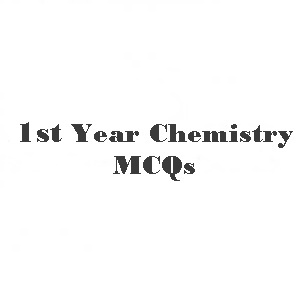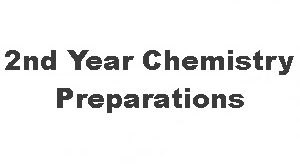If you are searching for Entry Test MCQs then the 1st Year Chemistry Chemical Equilibrium MCQs are available here. This chapter is about Chemical Equilibrium. There are two types of Chemical Reactions i.e. Reversible and Irreversible reactions. Reversible Reactions are in the format of Chemical Equilibrium. For the chemical reactions, the law of Mass Action is very significant. The reactions in the equilibrium state are stated by Equilibrium constant. There are some advantages of equilibrium constants. Le-Chatelier’s principle gives some importance to Chemical Equilibrium. Applications of Chemical Equilibrium consists of the Synthesis of Ammonia and Preparation of Sulphur Trioxide. Acids and bases have their own Ionization Constants. Lowry Bronsted gave the concepts of acid and base. Some applications are Common Ion Effect and Buffer Solutions. Solubility product has some advantages in Chemical Reactions. So, you can get the important MCQs of this chapter on this page below.
1st Year Chemistry Chemical Equilibrium MCQs

KEY POINTS
- Reversible and Irreversible Reactions
- State of Chemical Equilibrium
- Law of mass action
- Equilibrium Constants
- Applications of Equilibrium Constants
- Le-Chatilier’s Principle
- Applications of Chemical Equilibrium in Industry
- Ionic Product of Water
- Ionization Constants of Acids/Base
- Lowry Bronsted Acid-Base Concept
- Common Ion Effect
- Buffer Solution
- Buffer Capacity
- Solubility Product
Question#1. What will be the pH of 1.0 mol dm-3 of H2X, which is only 50% dissociated?
- 1
- 0
- 2
- Less than 0
Answer
Answer
Question#2. What will be the pH of 1.0 mol dm-3 of NH4OH, which is 1% dissociated?
- 2
- 12
- 0
- 2.7
Answer
Answer
Question#3. Buffer solutions are used in except?
- Clinical analysis
- Nutrition
- Soil science
- Qualitative analysis
Answer
Answer
Question#4. Buffer action can be explained by except?
- Common ion effect
- Le-Chatelier’s principle
- Law of mass action
- Solubility product
Answer
Answer
Question#5. At equilibrium, the concentration of reactants and products are:
- Constant
- Maximum
- Different
- Equal
Answer
Answer
Question#6. In the reaction A2(g) + 4B2(g) ⇌ 2AB4(g) such that ΔH < 0;the formation of AB4(g)will be favoured at:
- Low temperature and high pressure
- High temperature and low pressure
- Low temperature and low pressure
- High temperature and high pressure
Answer
Answer
Question#7. Consider the reaction PCl5 (g) ⇌ PCl3(g) +Cl2 in a closed container at equilibrium. At a fixed temperature, what will be the effect of adding more PCl5 on the equilibrium constant?
- It increases
- It remains unaffected
- It decreases
- Can’t be predicted without KP
Answer
Answer
Question#8. The oxidation of SO2 to SO3 is an exothermic reaction. The yield of SO3 will be maximum if:
- Temperature is increased and pressure is kept constant
- Temperature is reduced and pressure is increased
- Both temperature and pressure are increased
- Both temperature and pressure are decreased
Answer
Answer
Question#9. If the concentration of salt is greater than the acid in buffer solution, then the?
- pH = pKa
- pH = pKb
- pH > pKa
- pH > pKb
Answer
Answer
Question#10. In a saturated solution of AgCl, the molar concentration of Ag+ and Cl– is 1.0 x 10-5 M each. What is the value of Ksp?
- 1.0 x 10-5
- 0.1 x 10-5
- 1.0 x 10-15
- 1.0 x 10-10
Answer
Answer
Question#11. The solubility of Fe(OH)3 is x molar per dm3. Its Ksp would be:
- 9x3
- 27x4
- 3x4
- 9x4
Answer
Answer
Question#12. For the reaction H2(g) + I2(g) ⇌ 2HI(g). The equilibrium constant changes with:
- Total pressure
- The concentration of H2 and I2
- Catalyst
- Temperature
Answer
Answer
Question#13. The decomposition of N2O4 to NO2 is carried out at 280°C in chloroform. When equilibrium is reached, 0.2 moles of N2O4 and 0.02 mole of NO2 are present in 1:1 ratio. The equilibrium constant for the reaction N2O4 →2NO2 is______.
- 0.01
- 0.001
- 0.02
- 0.002
Answer
Answer
Question#14. In a given system, water and ice are in equilibrium, if the pressure is applied to the above system then:
- More ice is formed
- The amount of ice and water will remain the same
- More ice is melted
- Both a and b
Answer
Answer
Question#15. The solubility product of AgCl is 2.0 x 10-10 mol2dm-6. The maximum concentration of Ag+ ions in the solution is:
- 1.41 x 10-5 mol2 dm-6
- 1.41 x 10-10 mol2 dm-6
- 2.0 x 10-10 mol2 dm-6
- 4.0 x 10-20 mol2 dm-6
Answer
Answer
Question#16. An excess of silver nitrate is added to the aqueous barium chloride and the precipitate is removed by filtration. What are the main ions in the filtrate?
- Ag+ and NO–3 only
- NO–3 and Ba+2 only
- Ag+ and NO–3 and Ba+2 only
- Cl– and NO–3 and Ba+2 only
Answer
Answer
Question#17. The pH of 10-4 mole dm-3of HCl:
- 2
- 4
- 3
- 5
Answer
Answer
Question#18. The most suitable temperature for preparing ammonia gas is:
- 250°C
- 450°C
- 350°C
- 550°C
Answer
Answer
Question#19. The Kw of water at 25°C is given by:
- 10-7
- 10-10
- 10-12
- 10-14
Answer
Answer
Question#20. When HCl gas is passed through the saturated solution of rock salt, the solubility of NaCl:
- Increases
- May increases or decreases
- Decreases
- None of these
Answer
Answer
Question#21. For what value of Kc almost forward reaction is complete?
- Kc = 10-30
- Kc = 1
- Kc = 1030
- Kc = 0
Answer
Answer
Question#22. In which of the following Equilibria will Kc and Kp have not the same value?
- 2HI ⇌ H2 + I2
- 2SO2 + O2 ⇌ 2SO3
- N2 + O2 ⇌ 2NO
- All of these
Answer
Answer
Question#23. If the temperature is increased of the following reaction, then will go in
N2 + 3H2 ⇌ 2NH3 ∆H = -Ve
- Forward direction
- Remain constant
- Reverse direction
- Cannot be predicted
Answer
Answer
Question#24. The pH of an aqueous solution is 3.0 at 25°C. The hydrogen ion concentration in the solution would be:
- 0.001
- 0.01
- 0.0001
- 10-5
Answer
Answer
Question#25. Which one is very weak acid?
- HF
- H2CO3
- HCl
- H2O
Answer
Answer
Question#26. Which one increases by common ion effect except?
- Crystallization
- Solubility
- Association of ions
- All of these
Answer
Answer
Question#27. A basic buffer solution can be prepared by mixing:
- Strong acid and it is a salt with a weak base
- Strong base and it is a salt with weak acid
- Weak base and it is a salt with a strong acid
- Weak acid and it is a salt with strong base
Answer
Answer
Question#28. Which one is the best buffer those have:
- pH = pKa
- pH > pKa
- pOH < pKb
- pKa = 0
Answer
Answer
Question#29. The pH of an ideal buffer is:
- 10
- 7
- Less than 7
- 0
Answer
Answer
Question#30. If the ionic product is equal to Ksp then the solution is:
- Unsaturated
- Ideal
- Supersaturated
- Saturated
 Online Exams Tests Preparation
Online Exams Tests Preparation


